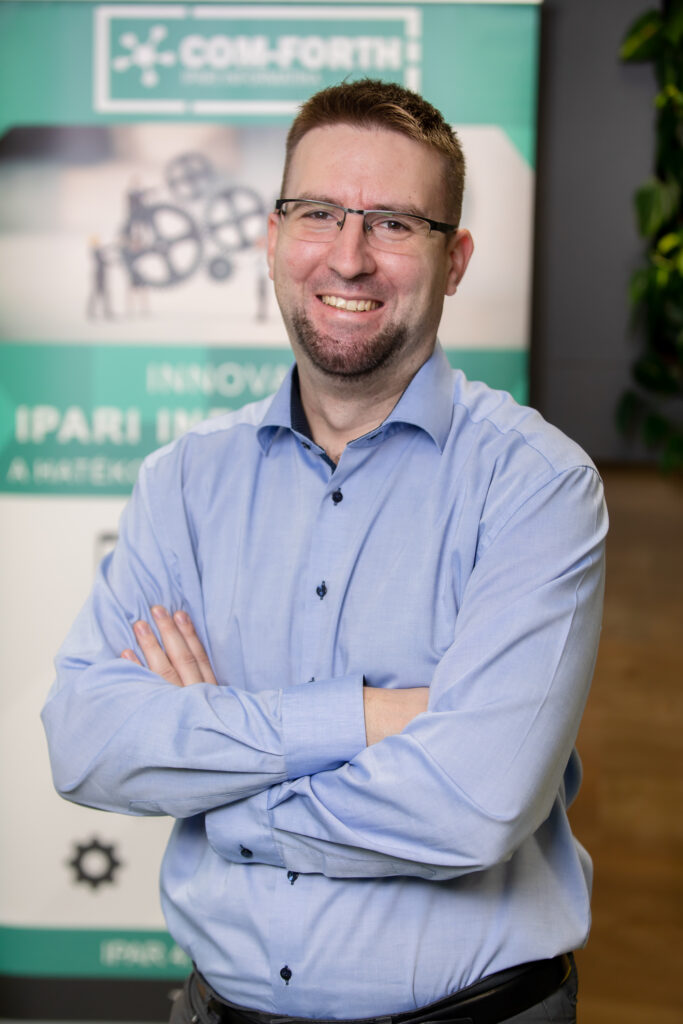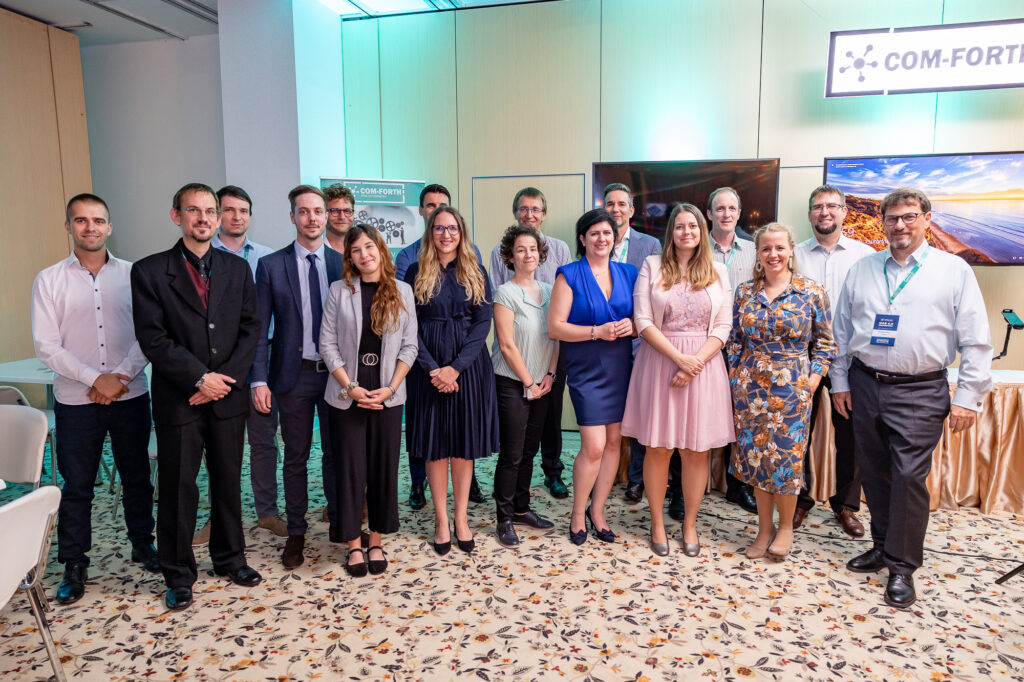In our Inspiring Digital Employers series, we’re bringing you some of our 300+ business clients from 4 countries. Meet Innoveo from Hungary.

Our partners inspire us not only to become better employers ourselves but also to contribute to their success with great new tech colleagues, in line with their business needs and matching their corporate culture. We’re proud to be their tech training and hiring partners, and happy to connect them with Codecool graduates, the best tech juniors on the market.
Meet Innoveo, a company delivering a Swiss-engineered no-code platform that helps to build enterprise-grade software quickly and efficiently while streamlining collaboration across teams. They transform digital experiences and achieve business growth with a true no-code, AI-enabled cloud platform solution. This time, we sat down for a chat with their Service Delivery Manager, Péter Tálas.
Nice to meet you, Péter! Please introduce your company to us. What is Innoveo like as a workplace?
We’re a US-based company working on disrupting the no-code software market through our platform called Innoveo Skye.
No-code was a niche market 5-10 years ago. It evolved from facilitating function-specific tools to enabling a broader range of business employees to own their automation and build new software applications without coding. By 2021 the market size reached USD 6 Billion, and estimates show that by 2025 this will increase to USD 47 Billion and USD 190 Billion by 2030, so the market potential is enormous.
This type of application development has become a lot more mainstream. Customers are looking for software solutions that not only address their specific problems and can become a strategic tool in their organisation to manage various IT system challenges. We’re part of this hype now and are working to be in the front row and centre, which is fantastic.
Innoveo was established in 2007, and back then, we had our headquarters in Switzerland, our first location. The Budapest office was opened in 2014 as a delivery center for our professional services. Since then, we have reached more than 70 people in our local headcount and plan further expansions in the coming years.
I know of other low-code platforms with a presence in Hungary, but a genuinely no-code platform company doesn’t exist here. Thus, if someone wants to be a part of this market opportunity, our company is the right place for it. We have a diverse community of almost 200 working from the mainland US, Puerto Rico, Switzerland, Hungary, Spain, and India.
We work with clients worldwide, including high-end players in the insurance and finance market. This is an excellent opportunity for anyone who is just starting their career or would like to evolve further professionally.
In Budapest, we upgraded the office multiple times in the past few years to accommodate the team’s growth and the recent challenges of the changing work environments due to the pandemic. We expanded our floorspace and added several meeting rooms and co-op spaces, including ergonomic furniture. We want to ensure that people feel comfortable coming to the office when needed and have the right environment to work together.
The company also provides excellent benefits, including private medical insurance, team events, and travel opportunities since our clients are all out of Hungary.
What type of software are you developing for your clients who’re present in the insurance industry?
Insurance business processes and operations have several challenges. We can offer many things to our customers, from simple quote-and-bind solutions in new business through managing distribution partners, brokers, agents, and agencies to offering customer portals, policy administration, and claims management systems.
However, our platform is not only built for insurance use-cases, as its modules and tools are made to build general building blocks of a modern web application.
Why are digital talent and skills essential for your business? What type of competencies are you mainly looking for when you’re hiring?
It depends on which team we’re hiring for. In the team I’m leading, we mainly have Business Analysts and System Analysts, who comprise the core of our implementation project teams. The first one is closer to a traditional business analyst role that you can see at other companies.
We hire people with excellent analytical, problem-solving, and communication skills for these roles. They need to know the software development lifecycles and how software requirements are discovered and structured into delivery phases.
When it comes to more senior roles, they need to have excellent domain knowledge in their respective fields to advise our customers on best practices and act as trusted advisors in insurance systems.
System Analysts are mainly responsible for the configuration work during our project executions. They have to have an innate knowledge of the platform and become a proficient user of it to create the best user journeys. They need to work in scrum teams of agile projects, so the knowledge of working methodologies of such squads is good to have upfront. We also guide them to understand how projects are being done in our organisation.
You can hear about the growing digital talent gap everywhere. What’s your opinion about it? How hard is it for you to find the right people nowadays?
Finding the right people has always been challenging, and you need to walk the extra mile – not because you might not find the right skills, but because of the human factor. During hiring, we check hard skills and problem-solving skills. But if a person has communication issues, we know that collaboration probably won’t be working with them.
We need to find personalities who fit in well with our team and are excited to work with our platform. In our last round of interviews, all candidates get a demo where they get a glimpse at how the platform works. It happens that they can immediately see how it might be easier to work with our platform and solve problems they had faced earlier in their career. So we can see genuine interest from their side in working with us in the future. Other times, they don’t see themselves working with it or just not getting excited about it, which is precisely why we keep these rounds and presentations to ensure mutual interest.
How do you grow the digital skillset of your organisation? Via hiring, training, both, or some other way?
We always get positive feedback on our onboarding process, a well-structured, usually 3-4 week long process that everyone gets when they join the organisation. They get basic and advanced platform training – they see the platform’s basic and more advanced aspects with real examples.
After this section, they meet a business simulation where they can get a taste of an actual project. They can live through some of the challenges our projects can put us through, like unexpected demands from partners, changing requirements, being challenged on proposed solutions, and so on. They can check how they’d react, and it’s always an excellent learning example; we can talk through the process, and our new joiners gather valuable learnings.
Besides our official platform user guides, we have community-edited knowledge repositories that should give ideas to the most common challenges and problems the colleagues might face in their everyday project work.
And from time to time, we have more specific internal technical training, like database or AIP development training.
We also recognise the need for other learnings outside our platform or our industry. Hence, we have launched a full-blown training platform, where people can freely browse among thousands of training, books and lectures on hard and soft skills.
What global and local trends do you see impacting your industry?
The no-code/low-code trend started eight years ago, but the market growth has been enormous over the past few years. This growth is a response to the shift towards digital transformation and the recently growing adaptation to remote work. One of the significant advantages of these platforms is that they promote high levels of business agility and significantly reduce the time to market and costs.
Though the last few years brought this significant growth, there are still a few challenges the industry needs to address. Fewer customisation options (compared to fully custom development), increased vendor lock-in possibilities, and security risks all work against these solutions.
At Innoveo, we are working on addressing all these aspects of the low-code development and increasing our competitive advantage. Nevertheless, the overall low technical barrier to entry and the endless development possibilities of the no-code/low-code will support the market growth in the coming years.
Why did you choose to partner up with Codecool?
We started to work with Codecool a year ago, and from the start, we knew that Codecool was an excellent match for us. We found that Codecoolers, when they graduate, already have those essential competencies that we need to be able to train them further. This is especially true for those who’ve done the Full-Stack Development course.
How do you see our cooperation? Why is it valuable for you? And what do you think of Codecoolers?
All Codecoolers have stayed and become great additions to our teams. We don’t need all skills they learn at the school. Still, we appreciate that they have a systematic approach and a full view of the development process, enabling them to understand our platform better. They are quick learners and gather all the necessary skills they need in two months to start working independently.
Plus, they bring some “fresh air” to our community because they’re young, motivated, eager learners.
What’s your long-term digital vision for your company? What are your most important projects right now?
We’re at an exciting period now, we’ve received quite a lot of funding in the past years, and we continue to raise money from investors this year, which will give us the ways to expand our teams further, improve our platform and services, acquire more new customers, entering new markets.
All this is super thrilling, and new joiners now come to us at a time when a lot of things are in the works.
How do you see our shared digital future?
It’s hard to see into the future; just think of how different our visions were 20 years ago of our life would look like today. I think digital automation, IoT, and AI trends will continue in the areas where they are already significant today, like personalised health care, mobility, smart energy, and so on.
It is hard to say how radically it will change things compared to the present.
I am interested in how technology will address climate change and reduce emissions in the energy, agriculture, and transportation sectors. At the same time, will it be able to keep its environmental footprint lower? Another thing I would probably keep my eyes on is the financial market regulations that will concern online banks, cryptocurrencies, and other financial services solutions that would leverage blockchain.
Finally, a growing interest in the metaverse is an exciting trend that keeps attracting major public and private funding.
Inspired by Innoveo’s example?
Reach out if you need great junior tech professionals or best-in-class training for your organisation.
Hope to talk to you soon!














